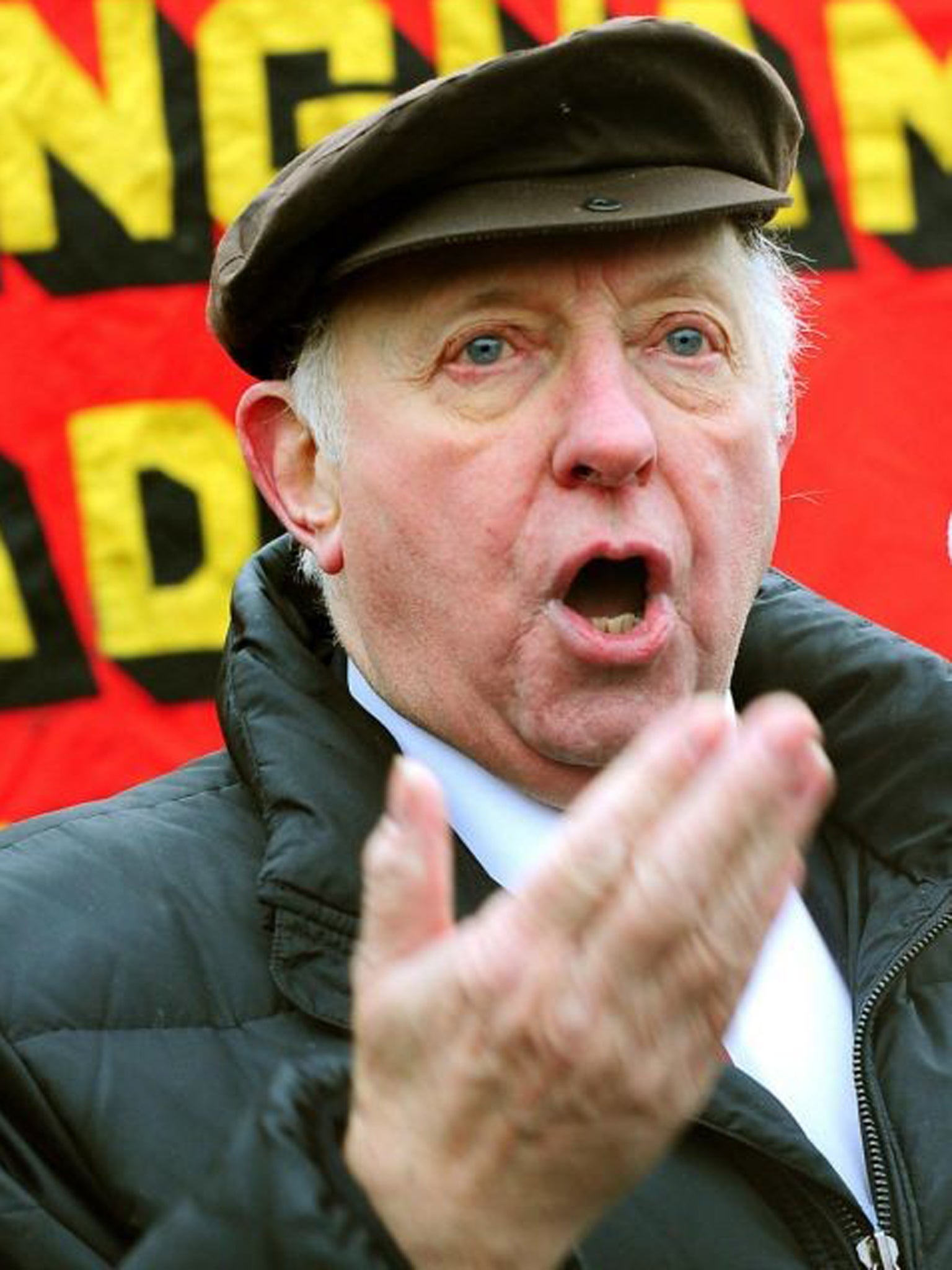Arthur Scargill ordered to pay rent as he loses fight to have union pay for London flat for life
Former NUM president: 'To any independent observer this is another judgment with the anti-Scargill feeling to it'

Your support helps us to tell the story
From reproductive rights to climate change to Big Tech, The Independent is on the ground when the story is developing. Whether it's investigating the financials of Elon Musk's pro-Trump PAC or producing our latest documentary, 'The A Word', which shines a light on the American women fighting for reproductive rights, we know how important it is to parse out the facts from the messaging.
At such a critical moment in US history, we need reporters on the ground. Your donation allows us to keep sending journalists to speak to both sides of the story.
The Independent is trusted by Americans across the entire political spectrum. And unlike many other quality news outlets, we choose not to lock Americans out of our reporting and analysis with paywalls. We believe quality journalism should be available to everyone, paid for by those who can afford it.
Your support makes all the difference.The legal battle has raged for years, but finally the former National Union of Mineworkers leader Arthur Scargill, will have to start paying his own London rent.
At the High Court, Mr Justice Underhill said the NUM was no longer obliged to meet the £34,000 annual bill for the £1.5m three-bedroom flat in the Barbican. Mr Scargill has occupied the apartment, rented from the Corporation of London, since June 1982. He retired in 2002.
At the heart of the matter were the precise details agreed at a meeting of the union’s national executive committee in 1982.
It was customary for retired union leaders to have a house effectively bought for them near the union’s London office, to be used not only while in office, but after retirement as well.
But Mr Scargill also had a mortgage paid for him by the NUM on a house in Yorkshire and it was also known at the time of his election that the union was likely to be moving its headquarters outside London, which it duly did.
When Mr Scargill first occupied the flat the NUM numbered several hundred thousand members. Now it has less than 2,000, all of whom are paying around £20 a year for their former leader’s housing.
The rent and associated expenses were paid by the union until 2011, except for a period between 1985 and 1991 when Mr Scargill met them.
The NUM’s counsel, Nicholas Davidson QC, had argued the case was not about whether anyone thought any particular obligation ought to exist, but whether it did exist, based on documents dating back 30 years and the identification of what terms were agreed between duly authorised representatives of the NUM and Mr Scargill. The former leader’s counsel, Timothy Pitt-Payne QC, argued that his client was entitled to the retirement benefits under the terms of his successive contracts of employment with the NUM.
The union also successfully disputed Mr Scargill’s fuel allowance at his Barnsley cottage and payment for the preparation of his annual tax return, but not the cost of the security system at the cottage.
The judge said Mr Scargill’s predecessors had enjoyed the “very generous benefit” of having houses in or near London bought for them by the union, adding that they were also allowed to occupy the properties after retiring at a very low rent, or to buy them at a “very reduced price”.
But Mr Scargill had not taken up the benefit when it appeared in his first contract in 1982, although the union’s national executive committee had agreed to pay the rent and other expenses on his Barbican flat, which was near the NUM’s London HQ.
The judge rejected Scargill’s claims that the union’s payment of the rent on the flat was intended to replace the benefit his predecessors had enjoyed, and was, therefore, a lifetime benefit.
The judge said the claim was not reflected in the original minutes of the NEC, was not backed up by the contract Scargill signed and pointed out that the union had continued to subsidise the mortgage on his Yorkshire home.
After the ruling, the NUM general secretary, Chris Kitchen, said it was “regrettable” that it had had to bring the case. Previously he has said that the NUM merely wished to establish whether it was liable to continue making the payments, and if it was, it would do so.
The NUM was also concerned that it may be expected to continue paying rent for any widow he might leave. Mr Scargill’s long-term companion is his former press officer, Nell Myers, now in her sixties.
Speaking outside court, Mr Scargill, now aged 74, told reporters he would have to talk to his lawyers before deciding whether to launch an appeal.
“There can be no doubt that 30 years ago I was given an entitlement to a property by the union and that entitlement continued during my retirement, as it had done for all my predecessors,” he said.
That practice had been applied to his predecessor Joe Gormley – later Lord Gormley – and it was determined in 1982 that he was to enjoy the same allowances and facilities.
He added: “To any independent observer this is another judgment with the anti-Scargill feeling about it.”
Join our commenting forum
Join thought-provoking conversations, follow other Independent readers and see their replies
Comments